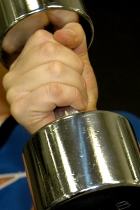 One of the most common injuries that we see in our clinic is shoulder impingement syndrome, which is characterized by a pinching sharp pain in the lateral shoulder and upper arm region, often with overhead activities, side lying or reaching behind you.
One of the most common injuries that we see in our clinic is shoulder impingement syndrome, which is characterized by a pinching sharp pain in the lateral shoulder and upper arm region, often with overhead activities, side lying or reaching behind you.
This can be an acute problem, or due to repetitive overuse.
A relatively common way of doing this injury is by doing overhead or forward push weights at the gym, often with heavy weights and a sudden build up too quickly.
So if you are doing shoulder weights at the gym, what can you do to minimize the risk of developing impingement problems?
Be aware of where your scapula (shoulder blade) is positioned:
Too many people try to lift too heavy and end up engaging in poor movement patterns, such as rounding the shoulder blades forward or lifting them up too far towards the ears. This decreases the space in your shoulder bones between which the tendons of the rotator cuff muscles run, increasing the likelihood of pinching the tendons and inflaming them. The rotator cuff muscles are an important group of shoulder muscles that help to lift the arm to the side, rotate it and keep it in its socket.
Don’t overload your shoulder muscles, particularly the rotator cuff muscles:
The rotator cuff muscles aren’t particularly big or powerful, as there role is often that of endurance and stability. So don’t try and do routines that work the shoulders for more than 2 days in a row, do let the muscles recover. This can include resting from chest and back strengthening too, as they can also fatigue the shoulder muscles. Fatigued muscles mean you are likely to subtly change the way you are moving and lifting, and this can lead to impingement of the shoulder muscle tendons
Be careful when doing strengthening in overhead positions:
The reality is that the shoulder is less stable when overhead, so the cuff muscles have to work strongly to support the shoulder. Therefore be aware that they can fatigue easily in this position. This also applies to positions when the arm is in the ‘stop sign’ position, ie. out to the side and externally rotated. The shoulder is vulnerable to being unstable in this position, and heavy weights in such a position can exacerbate this
Don’t ignore pinching pains in your shoulder:
These are warning signs that something is being irritated, and can progress rapidly if ignored. Recognise the difference in your body between fatigue and distress pains.
So by all means get going on those shoulder weights, but be smart about how you are doing them, and get any niggles looked at early. Often a simple change in position can be enough to settle the problem, and carry on in no time. A physiotherapy assessment of your shoulder biomechanics can help with this.









- 10 years ago
I have a shoulder problen caused at first by a car accident 1990s.for the past 2 months i havnt been able to raise my arm or reverse it very painful.dr given me celebrix 1 weeks supply at a time,alsotramadol 50grms at night.both tabs too strong,nauseus most of day.reluctant to take.steroid injection from dr. has improved movement.dr has not suggested physio would that help?